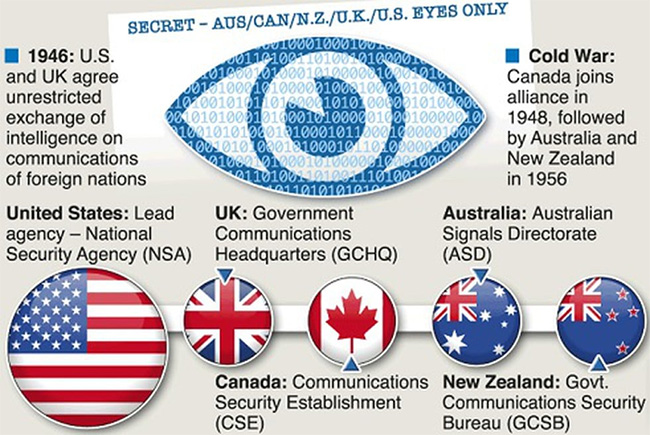The US is deepening intelligence cooperation with countries across Asia as it looks to counter Beijing’s sophisticated spying apparatus and blunt Chinese cyber attacks, writes Bloomberg.
The Biden administration has developed a set of separate but overlapping partnerships in Asia, including an intelligence-sharing arrangement with the “Quad” grouping of the US, India, Japan and Australia, according to US officials who asked not to be identified discussing matters that aren’t public.
The web of relationships also includes trilateral partnerships among the US, Japan and South Korea, and one encompassing the US, Japan and the Philippines, the officials said.
These new and strengthened partnerships, known formally as intelligence liaison relationships, are in part aimed at reducing the growing power of China’s spy apparatus, which a recent UK parliamentary report described as the world’s largest. The administration effort is part of a broader drive to deepen links across the region amid growing alarm at the threat from Beijing.
“Intelligence liaison can serve as an important force multiplier,” said Daniel Byman, a specialist on the topic at the Center for Strategic and International Studies in Washington. “It can expand overall collection as different countries will have access to different secrets in different parts of the world.”
The Office of the Director of National Intelligence declined to comment on the relationships. A White House spokesperson said US cooperation in the region includes sharing information but declined to comment on specific relationships.
Japan has been deepening security cooperation with like-minded countries in Asia and the Indo-Pacific, including on intelligence and information, Cabinet Secretary for Public Affairs Noriyuki Shikata said by email.
India’s Ministry of External Affairs declined to comment. The South Korean, Australian, Philippine, and Vietnamese governments did not respond to requests for comment.
In a meeting with US Defense Secretary Lloyd Austin Japan’s defense minister Minoru Kihara vowed to carry out a drastic upgrade of information protection and cyber security capabilities with American help, according to a readout from the Japanese Defense Ministry.
Still, obstacles remain — not least because of questions about the US’s own ability to keep a secret. In April, the Justice Department charged a 21-year-old National Guard airman, Jack Teixeira, with illegally disseminating classified information, including sensitive battlefield data about Russia’s invasion of Ukraine and revelations that the US eavesdropped on allies such as South Korea.
The partnerships will complement the “Five Eyes” arrangement that has long been the cornerstone of US intelligence partnerships. That informal network consisting of the US, UK, Canada, Australia and New Zealand has shifted its focus to China in recent years, but its exclusive English-speaking membership limits its reach and relevance in Asia.

Five Eyes countries have been sharing secret information for decades through intimate networks of officials that permeate their intelligence, defense and foreign ministries. Asia’s emerging spy pacts are much newer and will likely take time to rival the Five Eyes.
“The Five Eyes’ dominance is pretty established, but when you start to work on different problems you get different priorities,” Byman said. “As we shift to China, then countries like Japan and South Korea become more important, alongside Five Eyes partners in the region like Australia and New Zealand.”
read more in our Telegram-channel https://t.me/The_International_Affairs

 10:56 08.10.2023 •
10:56 08.10.2023 •























